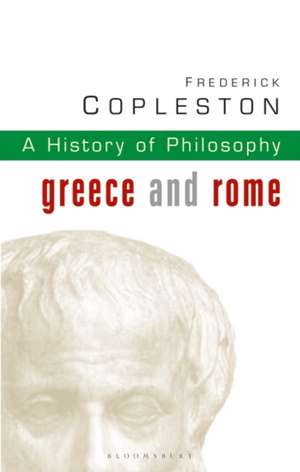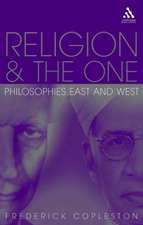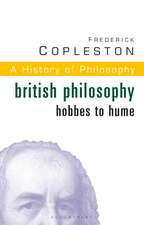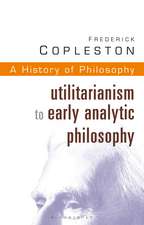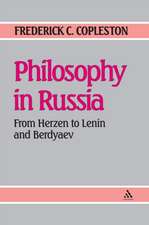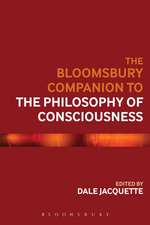History of Philosophy Volume 1
Autor Frederick Coplestonen Limba Engleză Paperback – 13 iun 2023
NEW STATESMAN
'We can only applaud at the end of each act and look forward to applauding again at the final curtain.'
TIMES LITERARY SUPPLEMENT
Frederick Copleston was Professor of the History of Philosophy and Dean of the Faculty of Theology at London University. This eleven-volume work is one of the most remarkable single-handed scholarly enterprises of modern times. Brimming with detail and enthusiasm, A History of Philosophy gives an accessible account of philosophers from all eras and explains their works in relation to other philosophers.
Each volume is an ideal guide for students studying specific eras and as a set offers a complete and unrivalled overview of the entire western philosophical tradition.
Volume 1
Greece and Rome
After its beginnings in Asia Minor, classical philosophy culminated in the writings of the two great philosophers: Plato and Aristotle. Later, through Neo-Platonism, Greek and Roman philosophical tradition exercised a great influence on the formation of Christian thought. In the first volume of A History of Philosophy, Copleston skilfully traces the major developments in Greek and Roman thought to provide an essential guide to classical philosophy.
Aristotle Epicurus Heraclitus Marcus Aurelius Parmenides Plato Plotinus Pythagoras Socrates Zeno
| Toate formatele și edițiile | Preț | Express |
|---|---|---|
| Paperback (2) | 142.47 lei 3-5 săpt. | +89.04 lei 7-13 zile |
| Bloomsbury Publishing – 5 ian 2003 | 142.47 lei 3-5 săpt. | +89.04 lei 7-13 zile |
| Bloomsbury Publishing – 5 ian 2003 | 171.89 lei 3-5 săpt. | +52.45 lei 7-13 zile |
Preț: 216.66 lei
Nou
Puncte Express: 325
Preț estimativ în valută:
41.46€ • 43.04$ • 34.57£
41.46€ • 43.04$ • 34.57£
Carte indisponibilă temporar
Doresc să fiu notificat când acest titlu va fi disponibil:
Se trimite...
Preluare comenzi: 021 569.72.76
Specificații
ISBN-13: 9781399412810
ISBN-10: 1399412817
Pagini: 544
Dimensiuni: 138 x 214 x 30 mm
Greutate: 0.72 kg
Editura: Bloomsbury USA
ISBN-10: 1399412817
Pagini: 544
Dimensiuni: 138 x 214 x 30 mm
Greutate: 0.72 kg
Editura: Bloomsbury USA
Notă biografică
Frederick Copleston
Cuprins
I IntroductionPART I: PRE-MEDIEVAL INFLUENCESII The Patristic PeriodIII St. Augustine IIV St. Augustine II: KnowledgeV St. Augustine III: GodVI St Augustine IV: The WorldVII St Augustine V: Moral TheoryVIII St Augustine VI: The StateIX The Psuedo-DionysusX Boethius, Cassiodorus and IsidorePART II: THE CAROLINGIAN RENAISSANCEXI The Carolingian RenaissanceXII John Scotus Eriugena IXIII John Scotus Eriugena IIPART III: THE TENTH, ELEVENTH AND TWELFTH CENTURYXIV The Problem of UniversalsXV St. Anselm of CanterburyXVI The School of ChartresXVII The School of St. VictorXVIII Dualists and PantheistsPART IV: ISLAMIC AND JEWISH PHILOSOPHY: TRANSLATIONSXIX Islamic PhilosophyXX Jewish PhilosophyXXI The TranslationsPART V: THE THIRTEENTH CENTURYXXII IntroductionXXIII William of AuvergneXXIV Robert Grosseteste and Alexander of HalesXXV St. Bonaventure IXXVI St. Bonaventure II: God's ExistenceXXVII St. Bonaventure III: Relation of Creatures to GodXXVIII St. Bonaventure IV: The Material CreationXXIX St. Bonaventure V: The Human SoulXXX St. Albert the GreatXXXI St. Thomas Aquinas IXXXII St. Thomas Aquinas II: Philosophy and TheologyXXXIII St. Thomas Aquinas III: Principles of Created BeingXXXIV St. Thomas Aquinas IV: Proof of God's ExistenceXXXV: St. Thomas Aquinas V: God's NatureXXXVI: St. Thomas Aquinas VI: CreationXXXVII: St. Thomas Aquinas VII: PsychologyXXXVIII: St. Thomas Aquinas VIII: KnowledgeXXXIX: St. Thomas Aquinas IX: Moral TheoryXL. St. Thomas Aquinas X: Political TheoryXLI. I IntroductionPART I: PRE-MEDIEVAL INFLUENCESII The Patristic PeriodIII St. Augustine IIV St. Augustine II: KnowledgeV St. Augustine III: GodVI St Augustine IV: The WorldVII St Augustine V: Moral TheoryVIII St Augustine VI: The StateIX The Psuedo-DionysusX Boethius, Cassiodorus and IsidorePART II: THE CAROLINGIAN RENAISSANCEXI The Carolingian RenaissanceXII John Scotus Eriugena IXIII John Scotus Eriugena IIPART III: THE TENTH, ELEVENTH AND TWELFTH CENTURYXIV The Problem of UniversalsXV St. Anselm of CanterburyXVI The School of ChartresXVII The School of St. VictorXVIII Dualists and PantheistsPART IV: ISLAMIC AND JEWISH PHILOSOPHY: TRANSLATIONSXIX Islamic PhilosophyXX Jewish PhilosophyXXI The TranslationsPART V: THE THIRTEENTH CENTURYXXII IntroductionXXIII William of AuvergneXXIV Robert Grosseteste and Alexander of HalesXXV St. Bonaventure IXXVI St. Bonaventure II: God's ExistenceXXVII St. Bonaventure III: Relation of Creatures to GodXXVIII St. Bonaventure IV: The Material CreationXXIX St. Bonaventure V: The Human SoulXXX St. Albert the GreatXXXI St. Thomas Aquinas IXXXII St. Thomas Aquinas II: Philosophy and TheologyXXXIII St. Thomas Aquinas III: Principles of Created BeingXXXIV St. Thomas Aquinas IV: Proof of God's ExistenceXXXV St. Thomas Aquinas V: God's NatureXXXVI St. Thomas Aquinas VI: CreationXXXVII St. Thomas Aquinas VII: PsychologyXXXVIII St. Thomas Aquinas VIII: KnowledgeXXXIX St. Thomas Aquinas IX: Moral TheoryXL St. Thomas Aquinas X: Political TheoryXLI St. Thomas and Aristotle: ControversiesXLII Latin Averroism; Siger of BrabrantXLIII Franciscan ThinkersXLIV Giles of Rome and Henry the GreatXLV Scotus IXLVI Scotus II: KnowledgeXLVII Scotus III: MetaphysicsXLVIII Scotus IV: Natural TheolgoyXLIX Scotus V: The SoulL Scotus VI: EthicsLI Concluding ReviewAppendicesI Honorific Titles applied in the Middle Ages to Philosophers treated in this volumeII A Short BibliographyIndex of namesIndex of subjects
Recenzii
A monumental history . . . learned, lucid, patient and comprehensive.
We can only applaud at the end of each act and look forward to applauding again at the final curtain.
We can only applaud at the end of each act and look forward to applauding again at the final curtain.
Descriere
Descriere de la o altă ediție sau format:
Copleston, an Oxford Jesuit and specialist in the history of philosophy, created his history as an introduction for Catholic ecclesiastical seminaries. The 11-volume series gives an accessible account of each philosopher's work, and explains their relationship to the work of other philosophers.
